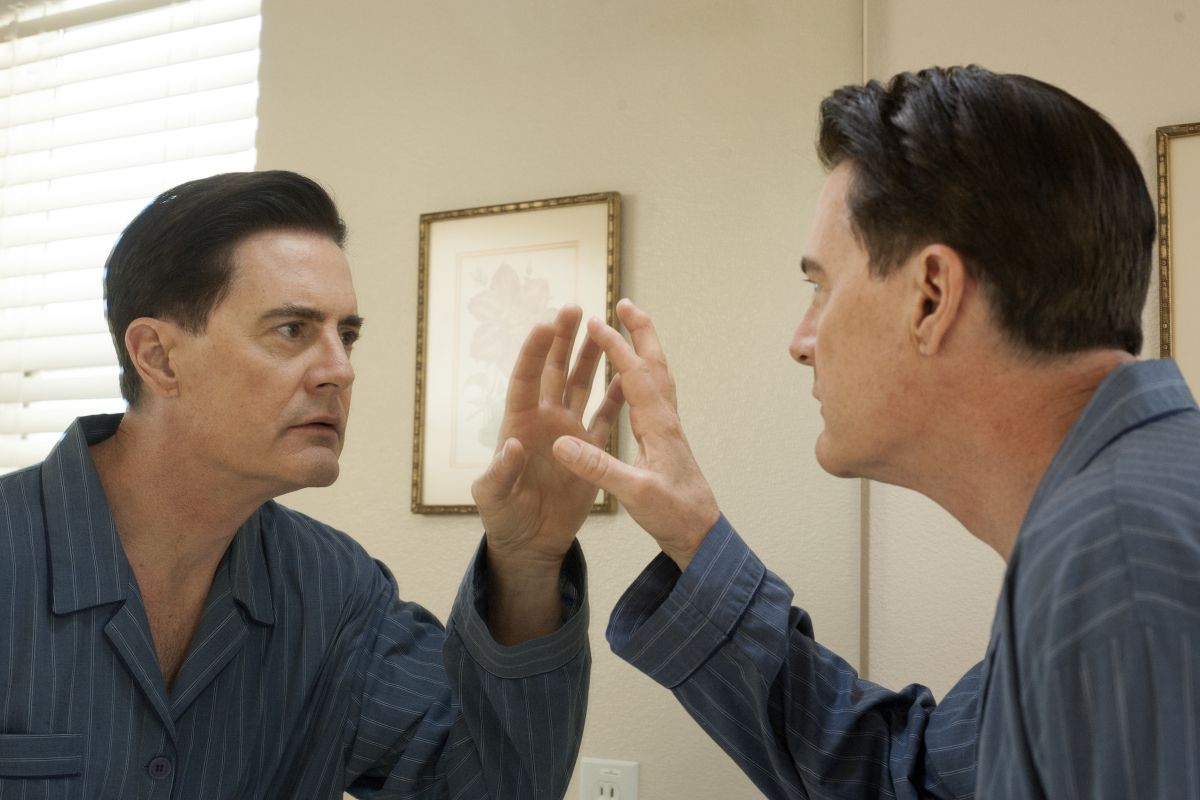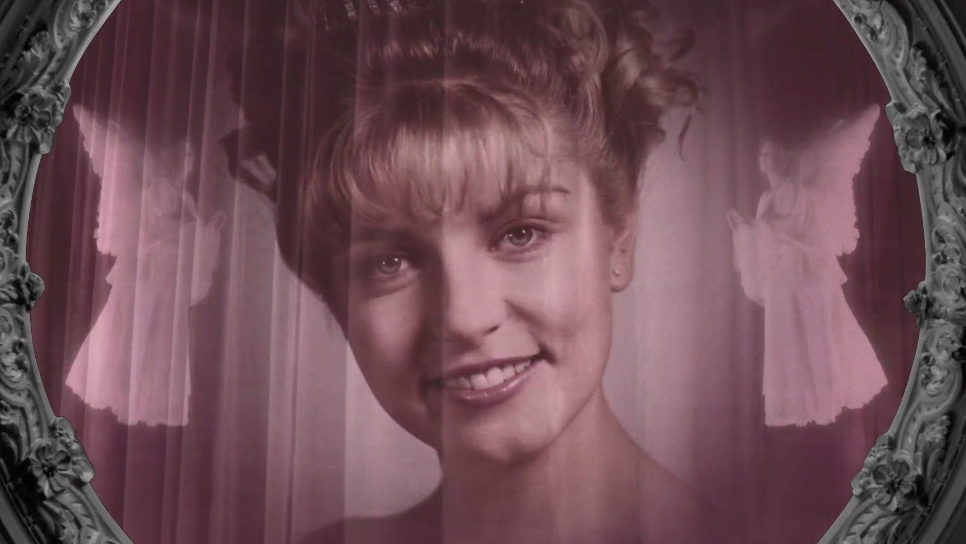Twin Peaks' evil twin
While the original Twin Peaks was superficially adorned with robins on pine branches and picnicking teenagers, Twin Peaks: The Return reveals the naiveté of such a world existing


A free daily email with the biggest news stories of the day – and the best features from TheWeek.com
You are now subscribed
Your newsletter sign-up was successful
If you're looking for David Lynch, the locals will tell you to go to the Dairy Freeze. With its cherry-red trim and neon ice cream cone on the roof, the Freeze has barely changed in the more than 60 years since it was built in North Bend, Washington, the former one-stoplight outpost on a now-defunct arm of I-90. Even as microbreweries and trendy outdoors shops bloom around it today, the Dairy Freeze holds on, as stubborn as a weed — an idyllic relic of a version of America that perhaps never existed at all.
Just down the street from the Dairy Freeze is the site of the fictional Double R Diner, preserved so as to be immediately recognizable from Twin Peaks. Twede's Cafe belongs to the same era as the Dairy Freeze, having been built in 1941, but it has become such a tourist trap that to experience it in person is like realizing a beloved actor is six inches shorter in real life than on screen. Waitresses wear tacky Twin Peaks shirts and the World War II-era counter is covered in random, ugly paraphernalia associated with the show. Neither the cherry pie nor the coffee is particularly damn good.
A post shared by Sarah Jurado (@sarahmjurado) on Jul 22, 2017 at 5:18pm PDT
The two restaurants are as different as Twin Peaks and Twin Peaks: The Return — one using the nostalgic appeal of kitschy Americana to sell French fries and shakes while the other exposes the construction of that illusion.
The Week
Escape your echo chamber. Get the facts behind the news, plus analysis from multiple perspectives.

Sign up for The Week's Free Newsletters
From our morning news briefing to a weekly Good News Newsletter, get the best of The Week delivered directly to your inbox.
From our morning news briefing to a weekly Good News Newsletter, get the best of The Week delivered directly to your inbox.
While the original Twin Peaks was superficially adorned with robins on pine branches and picnicking teenagers, Twin Peaks: The Return reveals the naiveté of such a world existing. Fast forward 25 years and suddenly Shelly is no longer a starry-eyed waitress but a 40-something single mother collecting tips at her diner job. Domestic violence and drug use are rampant; rundown trailer parks are witnesses to shootings and fires; a boy is randomly and senselessly killed crossing the road.
Since the original series aired on ABC over two decades ago, Lynch's vision of morality has been as literal and uncompromising as angels and demons. Laura Palmer is associated with a pure, undistilled goodness while her antithesis and torturer, Bob, is an evil as ancient and ever-present as the stars and the forests.
The conflict in The Return stems from this balance being disrupted: Evil Coop runs unchecked while his innocuous double, Dougie, is severed from the conscious of the ever-good Dale Cooper. But Twin Peaks has never been without Bob and seeing him damned back into the Black Lodge in the finale almost seems more spooky in that it couldn't possibly last. After all, Lynch proved as early as episode one that he has no interest in fan service and The Return does not exist to tie up loose ends.
So what is it doing?
A free daily email with the biggest news stories of the day – and the best features from TheWeek.com

The clue could be in the contrasts. Once you begin counting, the twins in Twin Peaks appear everywhere: The White Lodge, "a place of great goodness," and the Black Lodge, separated from our realm by a mere curtain, or the towering Fireman and The Man from Another Place.
Even locations are not neutral. Las Vegas, where Dougie is stranded for the first 15 episodes of The Return, is the opposite of the forested, tiny town of Twin Peaks, Washington. And on another level, what is the ultimate geographic doppelgänger if not Vegas, replete with a fake Venice, Egypt, Rome, and Paris?
The chasms between the contrasts make The Return Lynch's most political work to date: In one house, for example, an anonymous little boy with a strung-out mother tries to find ways to distract from his boredom while in another house somewhere across town, Sonny Jim is gifted a massive light-up jungle gym straight out of every 10-year-old's wildest dreams. "Every boy should have a jungle gym," one of the Mitchum brothers tells Sonny Jim, but it echoes as an unsettling reminder of how many do not get a piece of this idealized American dream.
Thankfully, Lynch is as unflinching in his portrayal of reality as in surreality. He does not gloss over conclusions with the promise that good will always win out over evil. If anything, evil is more powerful and prevalent (after all, Lynch left the series hanging for 25 years with Cooper's sarcastic snarl, How's Annie?) If Lynch is trying to tell us something about the world, it is cynical and pessimistic, a kind of garmonbozia itself.
This Sunday, 25 years after Twin Peak's original finale, Lynch has the opportunity to right that vision. By all indications, it seems almost as if he will — if The Return is the dark foil to the soapy original series, then its end must surely be positive where the other's was negative, the yin to its ultimate, upsetting yang?
But to hope for such a resolution might be simply kidding oneself. The Return serves as the "America was never great" rejoinder to a yearning to return to a glorified past. As nostalgic as it might be, the town of Twin Peaks as we know it was never without violence; it was a quainter version of America that dropped the bomb, too.
There is a final tidy metaphor here, one that might also be added to the list of twins. David Lynch plays two directors in two different worlds: FBI Deputy Director Gordon Cole in the one, and the architect of Cole's universe in another. In a story with such clear blacks and whites, Cole remains a kind of ambiguous force who knows more than he lets on.
With only two hours left in his masterwork, Lynch, too, hasn't signaled his intentions. Tellingly, though, despite making Twede's Cafe central to the Twin Peaks universe, Lynch still prefers the chocolate ice cream cones down the street.
There, under the yellowy lights of the Dairy Freeze, you can still imagine a world both wonderful and strange, even as the evidence that it doesn't exist is reflected on just the other side of the windows.
Jeva Lange was the executive editor at TheWeek.com. She formerly served as The Week's deputy editor and culture critic. She is also a contributor to Screen Slate, and her writing has appeared in The New York Daily News, The Awl, Vice, and Gothamist, among other publications. Jeva lives in New York City. Follow her on Twitter.
-
 The ‘ravenous’ demand for Cornish minerals
The ‘ravenous’ demand for Cornish mineralsUnder the Radar Growing need for critical minerals to power tech has intensified ‘appetite’ for lithium, which could be a ‘huge boon’ for local economy
-
 Why are election experts taking Trump’s midterm threats seriously?
Why are election experts taking Trump’s midterm threats seriously?IN THE SPOTLIGHT As the president muses about polling place deployments and a centralized electoral system aimed at one-party control, lawmakers are taking this administration at its word
-
 ‘Restaurateurs have become millionaires’
‘Restaurateurs have become millionaires’Instant Opinion Opinion, comment and editorials of the day
-
 Walter Isaacson's 'Elon Musk' can 'scarcely contain its subject'
Walter Isaacson's 'Elon Musk' can 'scarcely contain its subject'The latest biography on the elusive tech mogul is causing a stir among critics
-
 Welcome to the new TheWeek.com!
Welcome to the new TheWeek.com!The Explainer Please allow us to reintroduce ourselves
-
 The Oscars finale was a heartless disaster
The Oscars finale was a heartless disasterThe Explainer A calculated attempt at emotional manipulation goes very wrong
-
 Most awkward awards show ever?
Most awkward awards show ever?The Explainer The best, worst, and most shocking moments from a chaotic Golden Globes
-
 The possible silver lining to the Warner Bros. deal
The possible silver lining to the Warner Bros. dealThe Explainer Could what's terrible for theaters be good for creators?
-
 Jeffrey Wright is the new 'narrator voice'
Jeffrey Wright is the new 'narrator voice'The Explainer Move over, Sam Elliott and Morgan Freeman
-
 This week's literary events are the biggest award shows of 2020
This week's literary events are the biggest award shows of 2020feature So long, Oscar. Hello, Booker.
-
 What She Dies Tomorrow can teach us about our unshakable obsession with mortality
What She Dies Tomorrow can teach us about our unshakable obsession with mortalityThe Explainer This film isn't about the pandemic. But it can help viewers confront their fears about death.
